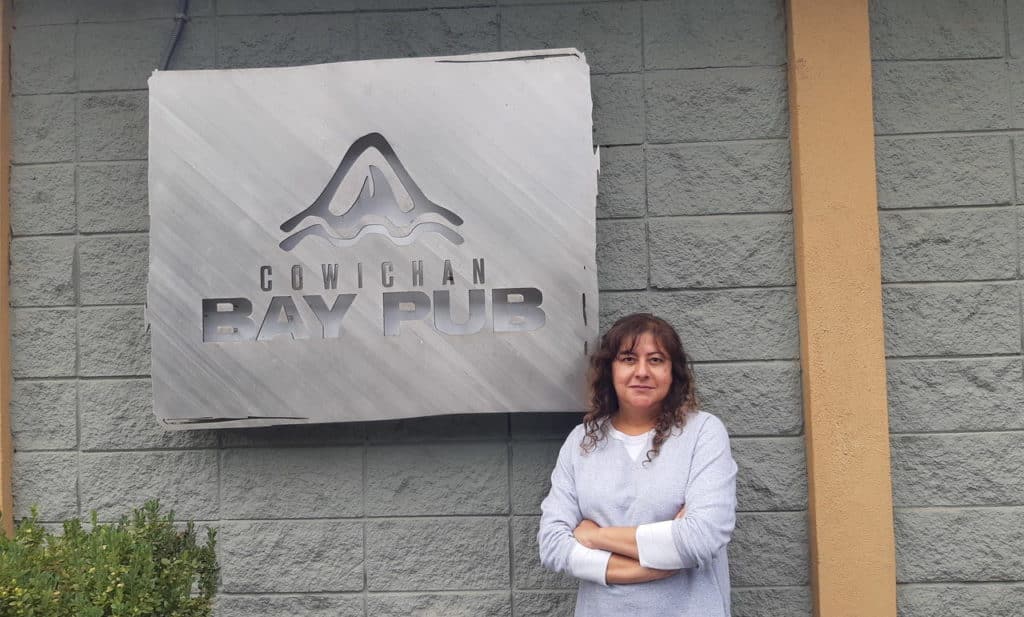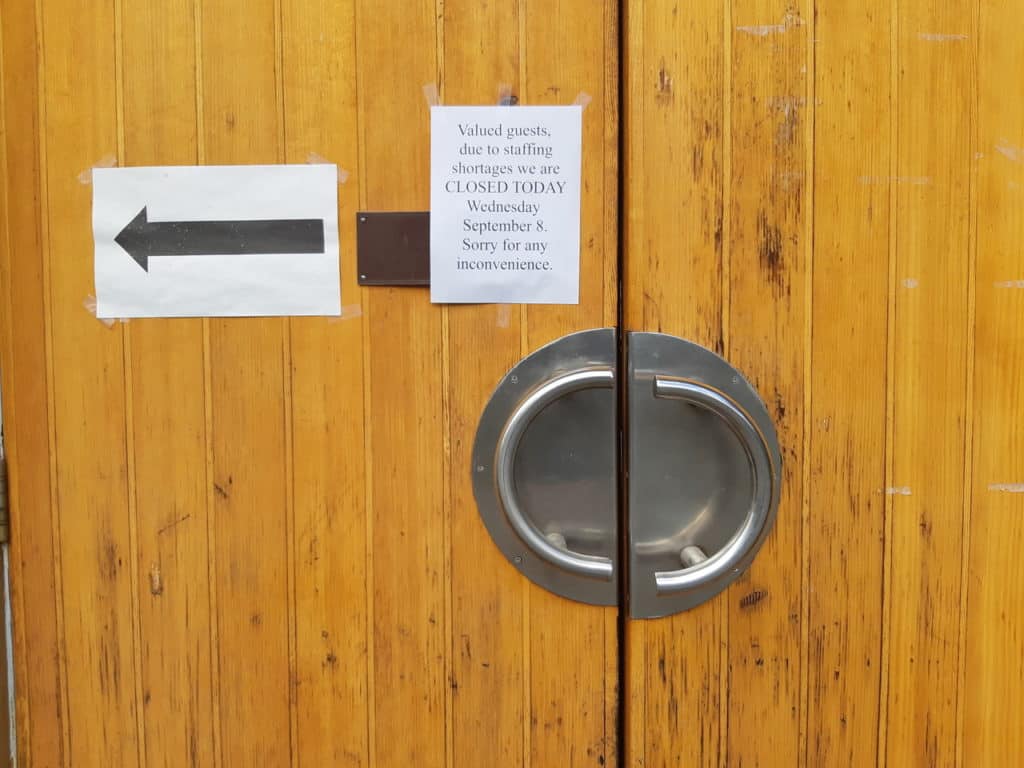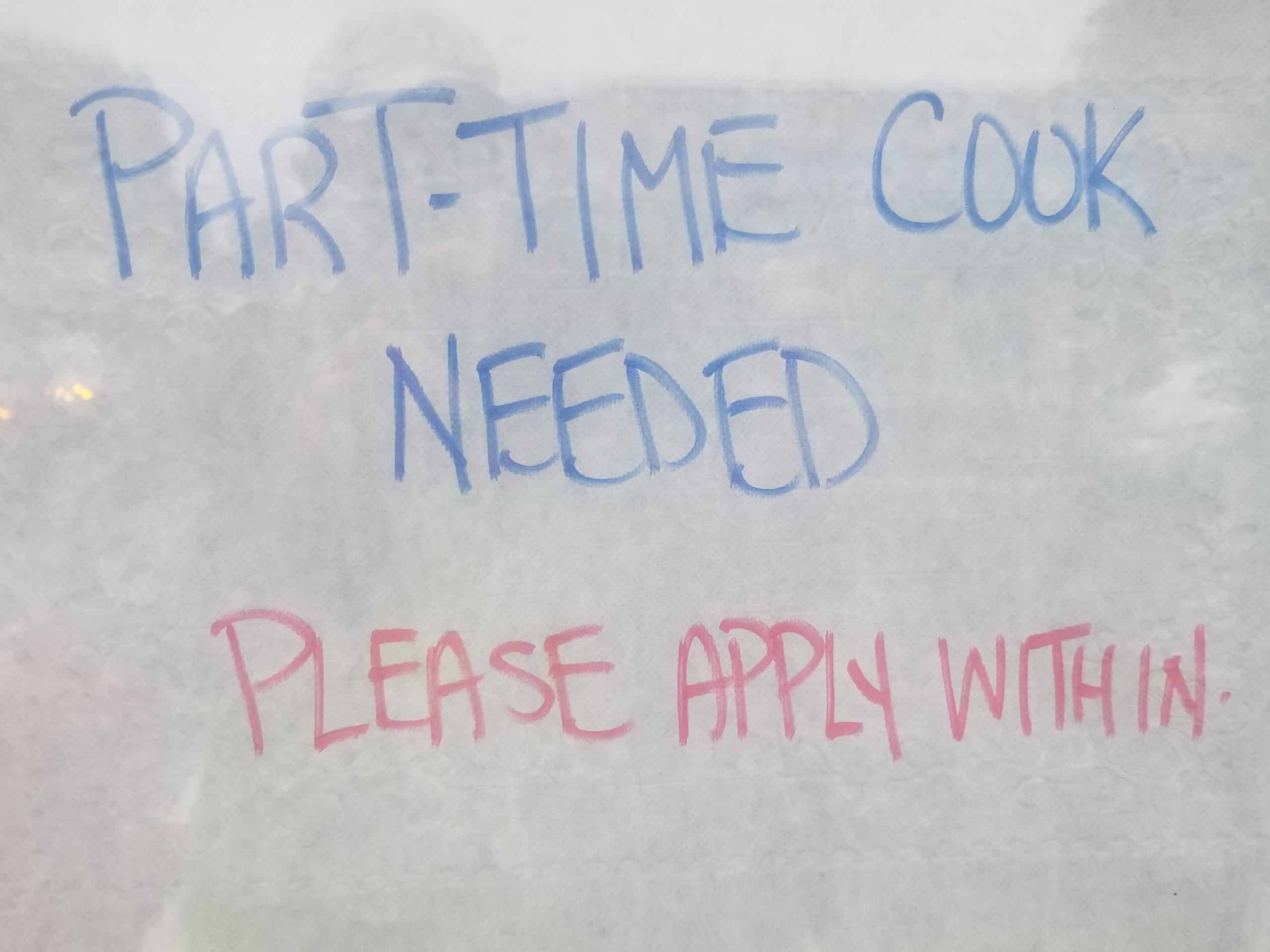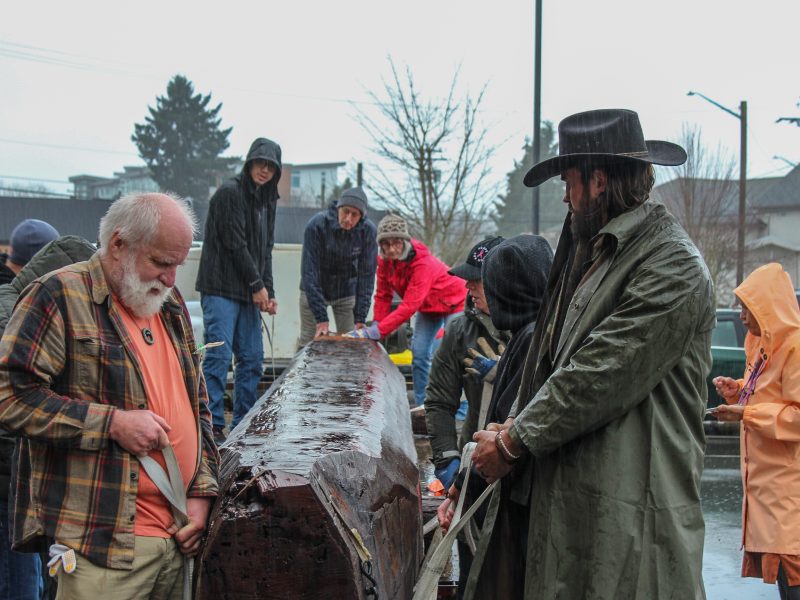
Since July, the Cowichan Bay Marine Pub has been closed on Wednesdays, even though it’s not one of their slowest days. That’s because several of Cowichan Bay’s eateries are coordinating their off days as a creative response to pervasive staff shortages plaguing businesses throughout the region.
“The idea was that two of us have to stay open each night of the week,” says Irwin Killam, who has owned the pub with her husband Chris for almost 19 years. Earlier this summer, she learned that other restaurants in Cowichan Bay were also having to close a night or two due to a paucity of cooks and other restaurant staff. So she spoke with her supposed competitors such as the Cow Café, the Rock Cod Café, The Masthead and The Vine to work it out so they wouldn’t all be closed on the same night.
“Closing different nights helps us all to stay in business,” she says. “As a community we stay stronger if we all unite together.”
Closing one day, whatever the day of the week, was a last resort, Killam says. The pub tried offering $1,000 signing bonuses to attract experienced cooks, but got no takers. “We couldn’t hire anybody,” Killam says.

It’s the same story for many businesses in the Cowichan region. From beauty salons to retail stores, a general shortage of labour has led to reduced hours and services as well as concerns about their financial long-term viability.
But opportunities exist even in this struggle, local analysts tell The Discourse. Job seekers are well positioned at this moment to find work that suits them. And businesses, with the right approach, could tap into labour markets that haven’t yet reached their potential.
How bad is the current labour shortage?
On Friday, Statistics Canada reported that British Columbia is for the third month in a row the only province where employment is higher than its pre-pandemic level. That means that there are fewer people looking for work now than before COVID-19, even as businesses are desperate to hire. The unemployment rate for Vancouver Island and the coast is 5.1 per cent, which is lower than B.C. overall, at 6.2 per cent.
The hospitality industry is just one of several sectors suffering locally from a lack of workers, says Sonja Nagel, executive director of the Duncan Cowichan Chamber of Commerce. She says that business owners are regularly calling the Chamber in crisis because they can’t find workers and are so short-staffed that they don’t even have time to apply for government grants.
Nagel says that she is “gobsmacked” by various incentives that local businesses are offering as part of job recruitment, such as signing and referral bonuses. She adds that it’s the first time she has seen manufacturers and other businesses posting hourly wage rates in their help wanted ads.
She worries that the labour shortage will affect the reputation of the area as a tourism destination. “We’re in a situation with major tourism booming here on the Island and not the staff to support it in the hospitality sector,” Nagel says. Along with restaurants taking days and nights off, she says that many hotels are running at decreased capacity because they don’t have enough cleaning staff.
Related Article: With tourism off the menu, local restaurants chart a new course
Johnna Puusa is a labour market specialist with WorkBC Duncan and she reports that her office has been much busier than usual responding to employers who are desperately looking for workers. She says that while the service and construction industries seem the hardest hit, the labour shortages are happening across the board.
“It’s a buyer’s market,” she says. “It’s a great time to look for work, because there’s so many jobs and wages are rising.”
Barry O’Riordan, manager of Economic Development Cowichan says that the inability to fill positions is hurting many local businesses. Some have packed it in recently and closed their doors for good, such as The Ainslie and Hattie’s Farm to Table restaurants. The businesses that have closed have cited the labour shortage as the No. 1 reason, O’Riordan says.
Why are workers so hard to find?
There was already a local labour shortage before the pandemic, according to O’Riordan and others, although it wasn’t as acute as it is now.
He says that part of it is due to demographics, with a declining birth rate and Baby Boomers beginning to retire. The Cowichan Valley is aging faster than most regions, with the median age of Cowichan residents rising from 41.3 years old in the 2001 census to 49.9 years in the 2016 census. Many of the newcomers to the region are coming here to retire; according to the 2019 Buyer Profile from the Vancouver Island Real Estate Board, 58.6 per cent of homebuyers in the Cowichan Valley bought their home for retirement purposes.
Another ongoing issue is the affordable housing crisis. “There are not enough places to live for people, especially people who work at an hourly wage,” Puusa says. She reports that she regularly hears about people of working age wanting to relocate here but who are dissuaded when they can’t find anywhere to live.
Related Article: Local restaurants change with the changing times
Then came the COVID-19 pandemic, which has contributed to the labour shortage in various ways.
The Canada Emergency Response Benefit and its successor the Canada Recovery Benefit have gotten a lot of blame for being a work disincentive. (The Canada Recovery Benefit is set to expire on Oct. 23, though it may be extended.) However, Puusa and others say it is far from the only contributing factor.
O’Riordan explains that from the analyses that he’s read, there are a number of reasons why workers have left jobs during the pandemic. These include health and safety concerns, the increased availability of jobs that can be done online, and the precarious nature of service jobs affected by changing public health orders.
It’s also been an opportunity for people to reassess their work lives and in some cases get trained in a new field, O’Riordan says. “For those who were considering changing careers, this has been the impetus to act on thoughts that have been lingering.”
There has also been the draw of higher-wage jobs in other places such as Victoria. Nagel says that she is aware of a lot of local people “who have jumped ship” from the hospitality sector to work in fields such as construction, biotech and healthcare. “We can’t blame the CERB,” she says.
For Killam at the Cow Bay Pub, along with the volatility of “all the openings and closings and openings,” the stress of having to police behaviour is turning workers away from the hospitality industry.
“It is high-anxiety,” says Killam, who helps out as a bartender, server, and hostess. “Every shift, we walk into work in a panic mode: ‘I don’t know what I’m going to deal with today.’ No one should have to deal with that.”
She fears that this week’s implementation of the BC Vaccine Card will worsen the labour shortage in the hospitality industry. Already subject to verbal abuse by a small minority of customers, she told The Discourse last Wednesday that she fears the reaction by both people opposed to the vaccine requirement and those who want stricter enforcement.
“Staff literally don’t want to work anymore,” she says. “I have every single one of them saying, ‘We’re going to get yelled at.’”
Creative solutions needed to find and keep workers
“The biggest untapped potential is attracting, recruiting and retaining young Indigenous workers,” wrote Eyvette (Qwuyumaat) Elliott in her recent blog post, “Labour Shortage or Dated Recruitment and Retention Practices?”

Elliott is the owner of Ever Plan, a human resource and business consultancy, and a member of Cowichan Tribes. She tells The Discourse that employers would benefit from having a greater understanding of Indigenous cultures. She says that it is difficult for those immersed in cultural activities, which sometimes last for weeks, to gain meaningful employment when employers are inflexible with work schedules.
Overall, she calls for a big shift in the nature of work and how employees are recruited and treated.
“The pandemic has really highlighted that workplaces need to be more people-oriented and responsive and adaptable,” Elliott says. “I’ve seen many friends that have left their jobs because they’re like, ‘The company doesn’t care about me, so why should I care about them and their bottom line?’”
Employers should have “an honest conversation” with employees about how everyone’s needs can be met, Elliott says. She advocates for changes such as more work-from-home options and mental health days, job descriptions that aren’t set in stone, flexible work hours and even companies sharing employees.
“It’s not the same world that we used to live in, and there needs to be a different level of flexibility and different way of doing things,” she says. “The pandemic has shown us that of course we can have some flexibility and we don’t need to be as rigid as we once were.”
Puusa, with Work BC, agrees that employers would benefit from seeking out a diversity of potential employees. “There is still a large population of underrepresented people who want to work who are not working,” she says. These include youth, people with disabilities, Indigenous people and others.
She says that businesses are making a mistake by not recruiting these populations, even if some accommodations and patience are required. She says it would help if employers changed restrictive language in job postings, which she says can dissuade potential workers from applying because they don’t think they are qualified.
‘Think outside the box’
Businesses are doing everything they can to come up with innovative ways to attract staff and keep the doors open, O’Riordan says. “I’ve heard of lots of businesses trying to think outside the box in terms of what they’re going to do to help provide the labor needed in order to keep their operations going. And they’re doing whatever they can.”
At the local level, O’Riordan says that tackling housing affordability is key to boosting the region’s workforce. He is also working with the Duncan Cowichan Chamber of Commerce to come up with a playbook of ideas to address the labour shortage. He says these range from bringing in temporary foreign workers to fill unfilled positions to making the region attractive for tech companies able to offer locals well-paid jobs.

Nagel says the chamber is telling businesses to get in touch with WorkBC to find workers and take advantage of the Wage Subsidy program.
The program can pay 50 per cent of a new-hire’s wages and on-the-job training for as long as six months, or 75 per cent when hiring employees from certain groups, including youth and people with disabilities. Puusa explains that late last year WorkBC made the program more accessible by waiving a requirement that candidates needed to have paid into an employment insurance program to be eligible for a wage subsidy.
“The Cowichan area has one of the highest uptakes of this program since the changes happened back in November,” Puusa reports. She adds that WorkBC Duncan tries to negotiate with businesses receiving wage subsidies to use it as an opportunity to increase wages, but notes that not all employers do.
Meanwhile, at the Cowichan Bay Marine Pub, the head chef hasn’t had two consecutive days off since they reopened. Killam says they’ve begun experimenting with ways to give their cooks more manageable hours. Last Thursday, the pub turned the kitchen over to Pam and Cam Stiles, who last month closed their Holy Cow Indian Eats business, for curry specials along with limited pub fare. “We need to do something because they [the region’s cooks] are all burning out.” [end]
Editor’s note, Sept. 20, 2021: A previous version of this article stated that WorkBC previously required employers to have paid into employment insurance to be eligible for the wage subsidy program. In fact, it what the job candidates that previously needed to have paid into EI. The article also stated that wage subsidies would cover up to 50 per cent of wages, when in fact they can cover 75 per cent of wages for employees in certain underrepresented groups.



